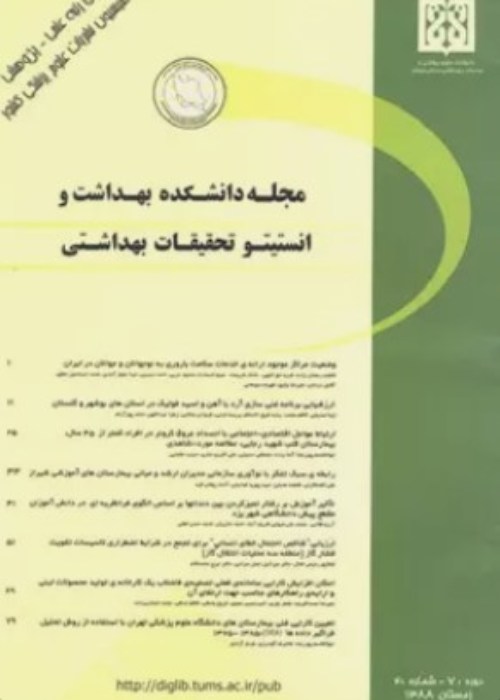Factors affecting self-care in women with osteoporosis: a qualitative study with the content analysis approach
Author(s):
Abstract:
Background And Aim
Although self-care is known to affect favorably the control and treatment of osteoporosis، the effective factors from the patients’ viewpoint have not been investigated. The aim of this study was to explore factors affecting self-care from the viewpoint of women suffering from osteoporosis. Materials And Methods
This was a qualitative study conducted with a content analysis approach in 2014، including 15 women consulting the bone mass densitometry centers in Sanandaj، Iran، selected by purposeful sampling. The inclusion criteria were women aged ≥ 50 years suffering from osteoporosis diagnosed definitively at least 6 months before، a T-score index > -2. 5 (lower back or hip bone)، taking drugs upon a physician’s advice، ability to speak، and willingness to participate in the study. Data were collected through face-to-face and group semi-structured in-depth interviews and analyzed using the content analysis method. The accuracy and rigor of the data were confirmed based on such criteria as credibility، confirmability and transferability. Results
Five main categories were extracted including “background factors of the disease”، “hope and weakness in confrontation with the disease”، “role of the physician”، “role of the family”، and “administrative centers and organizations”. Based on further analysis of the data، 11 subcategories were emerged including “cultural issues”، “lack of knowledge”، “non-priority of health”، “weakness and fear”، “hope for the future”، “positive role of the physician”، “negative role of the physician”، “active role of the family”، “passive role of the family”، “role of the media”، and “information centers”. Conclusion
The finding of the study show that the responsibility of women suffering from osteoporosis towards their health is not a single-factor، but rather a multifactorial، phenomenon. Pre-requisites for empowering women to adopt self-care behaviors include increasing their hope to live longer، physician’s attention to the patient’s needs، increasing health promotion programs in the media، and strengthening role of the family (particularly role of men).Keywords:
Women , Osteoporosis , Self , Care , Content Analysis
Language:
Persian
Published:
Scientific Journal of School of Public Health and Institute of Public Health Research, Volume:13 Issue: 2, 2015
Pages:
17 to 32
magiran.com/p1448939
دانلود و مطالعه متن این مقاله با یکی از روشهای زیر امکان پذیر است:
اشتراک شخصی
با عضویت و پرداخت آنلاین حق اشتراک یکساله به مبلغ 1,390,000ريال میتوانید 70 عنوان مطلب دانلود کنید!
اشتراک سازمانی
به کتابخانه دانشگاه یا محل کار خود پیشنهاد کنید تا اشتراک سازمانی این پایگاه را برای دسترسی نامحدود همه کاربران به متن مطالب تهیه نمایند!
توجه!
- حق عضویت دریافتی صرف حمایت از نشریات عضو و نگهداری، تکمیل و توسعه مگیران میشود.
- پرداخت حق اشتراک و دانلود مقالات اجازه بازنشر آن در سایر رسانههای چاپی و دیجیتال را به کاربر نمیدهد.
In order to view content subscription is required
Personal subscription
Subscribe magiran.com for 70 € euros via PayPal and download 70 articles during a year.
Organization subscription
Please contact us to subscribe your university or library for unlimited access!


